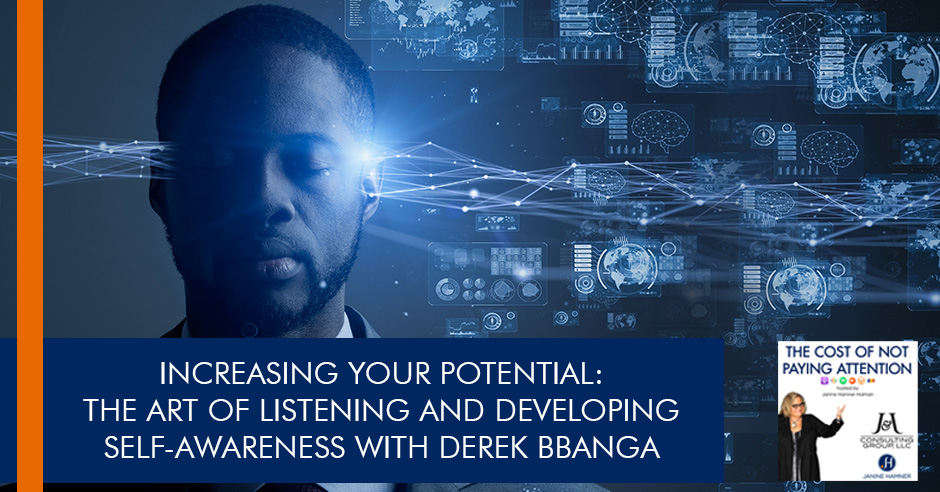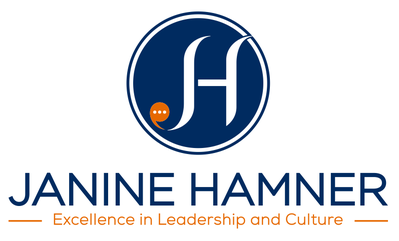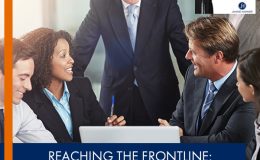
The key to connected with other people is paying attention to the art of listening and developing self-awareness. In today’s episode, Derek Bbanga, the Regional Director of Alpha Group, discusses with Janine the essential factors to increasing your potential. Leaders need to put more “intentionality” on listening to create a more vital link between themselves and their employees. Derek explains the KASH growth formula, which employs your knowledge, attitude, and skill, and forms it into a habit. There are many more nuggets that Derek shares so tune in to this episode to learn about how you can become a leader who connects with, and therefore empowers, people more!
GUEST: Derek Bbanga | LinkedIn | Visit their Website: Alpha Group
HOST: Janine Hamner Holman | [email protected] | LinkedIn, Facebook, Instagram, and Twitter
—
Listen to the podcast here
Increasing Your Potential: The Art of Listening and Developing Self-Awareness with Derek Bbanga
What am I paying attention to? The concept of psychological safety. This is an idea that you may have heard me talk about before was created by Amy Edmondson, a professor at Harvard University. The idea, in a nutshell, is the belief that we will not be punished, humiliated, nor have anything else negative happen to us when we speak up with ideas or questions or concerns or even make mistakes. Mistakes that we make, or that we are concerned that the organization might be making.
I’m thinking about this at the moment because I am working with a new client. It’s a family-owned business that was originally owned by the grandfather and is now owned by the father. Now the business is run by the father and his son. Actually, there are a couple of different sons, a daughter, a couple of cousins, and nephews who are involved in running the business. They called me because they had an opportunity come up and they weren’t sure that it was the right thing to do.
They thought it might be a mistake. They wanted to run it by somebody who they trusted, which tickled me pink because I’ve only been working with this client for about a month. Granted, I’ve known the dad for years. We already had a relationship going into this, but what I loved about it was here is a man and his son who have created a culture within their organization that when something comes up, it’s a good idea to look to other people and check it out, like, “What do you think about this? This opportunity came up and I have a funny feeling about it. I feel like it may not be the right thing for us to do.”
In the end, we decided that the best thing for them to do would be to pass on this. It didn’t feel right to any of us. What they wanted to do was to call somebody and check in like phone a friend. They wanted to see, does this seem like a good idea. Should we go down this road? I think the more that we lean into asking those kinds of questions of ourselves, of our colleagues, and of the organization, the stronger we are. My guest for this episode, Derek Bbanga, works with professionals and organizations to help them be seen, heard and remembered for the right reasons. Isn’t that brilliant?
How often are we remembered for the things we might prefer somebody to forget? He works with organizations and professionals to have them be seen, heard and remembered for the right reasons. He is joining us from Nairobi, Kenya. Most of his clients are in East Africa, and he has clients all over the world. He and I met and got connected through the Global Chamber. If you’re not familiar with them, I would encourage you to check them out. He is one of the leaders of the Global Chamber in Africa. When I started hearing him talk, I thought, “Derek and I are on the same wavelength.” In our conversations, it became more clear that that was true.
Welcome, Derek.
Thank you so much, Janine. I am thrilled to be with you and thank you for that wonderful story about psychological safety. I can’t wait to get started.
I need to let people know, among other things, you are so dedicated to both your work and being a great partner with people, including me. As we are recording, it is 4:00 in the morning where you are. It is 6:00 in the evening here in Southern California. I extra appreciate you being up at this crazy time to have this conversation with us.
I took Robin Sharma’s advice. Robin Sharma talks about the 5:00 AM club and generally, people who start their days earlier tend to be a little bit more productive, maybe successful. I’ve taken the extreme version of it. I am a morning person, Janine. This is my time of the day.
That’s great. Part of what’s wonderful about getting going early in the morning is that we get to starte our day when things are still quiet in the world. I don’t know about you, but I often think better. I’m often more creative when I am in that space of quiet and solitude and a little more reflective. Do you have that same experience?
Yes, Janine. I am big on routines, on habits, on starting your day right. I believe everything flows from there. For me, getting up early allows me to put into place some of these morning routines and habits that hopefully set me up for success for the rest of the day. There are some people whose mornings perhaps don’t allow for that. I’m fortunate enough to be in a position where I can get up and I can do a little bit of my meditation. I can do my morning affirmations.
Getting up early morning allows you to put into place some morning routines and habits that will set you up for success for the rest of the day. Share on XI start with my first win of the day making my bed, for example. Even if everything goes downhill, we always come back home and look at that bed and say, “There was one thing that went right.” I also take time for a little bit of exercise and other things that I think we need as professionals, particularly in this world that we live in with all of this flux and all of this change and everything that has taken place. Especially over the last few years, we need to begin establishing things that help us be more productive and be more successful. Mornings work for me, for sure.
If mornings work for you, then embrace Derek’s habit. If they don’t, find new habits that will help create that sense of both accomplishments and set you up for success, as Derek was pointing to. We are certainly in one of the periods of time that is characterized by change more than maybe any other. There are so many things that are uncertain, from the pandemic to the economy. Big things that are outside of our control.
As I know you know, human beings hate uncertainty. Our brains are wired to go to things that are certain and to stay away from things that are uncertain. It’s the reason that I will pick a fight with my husband to get to certainty, even if the result is not what I want. My brain impels me to find certainty. The more we can create habits and routines in our day, it creates that feeling of certainty, even in an uncertain world. It’s one of the things that I love about routines.
You can even rewire the brain sometimes because we’ve all picked up maybe poor habits. There are things that we can start doing to rewire the brain. As you said, that is looking for this particular route to certainty. I agree with you.
I’m going to ask you the question that I often ask at the beginning of the show, which is, Derek, tell me something that you’ve become aware of that people are not paying attention to either consciously or unconsciously. What is the cost of that inattention?
I prepared myself for this question. The one thing that I have noticed is that people are not paying attention to is the art of listening. I always say, “God gave us two ears and one mouth. They should be used in the right proportion.” I have a lot to say. I tend to think that I am marginally more interesting than other people. I have a lot to say and a lot to share, so sometimes I have to use my own advice.
When I talk about listening, it’s about deeper listening. A lot of times, as we are listening to some people, we’re already preparing the answers even before the person has finished. Listening involves the entire body. Physically, it’s your body language. You turn your body towards a person. Your feet generally should be facing the person. You’re angled towards the person. Your eyes are looking at them, and you are listening with your entire being.
It’s not a question of the words being spoken and listening with our ears. Use your entire body too. In the moment, make that person feel like they’re the most important person in the world. They are the most exciting. It is something that can be a game-changer in terms of how we interact with people in this world.

Increasing Your Potential: We listen to others with our entire body. And, at the moment, make that person feel like they’re the most important person in the world.
Better listening, and listen without judgment, suspend judgment. No matter what the person says that you may agree or disagree with, listen without judgment. Suspend that for a minute. Take in what they’re saying. Take a little bit of time to understand where they’re coming from and give your feedback or response. That’s something that I have noticed in other people, but I’m also trying to put into practice myself.
I love your phrase, deeper listening. I think that this is such a great thing to be focusing on both with ourselves and in relationships to other people. I completely agree. I read an article that said when people think they are listening 90% of the time, they are doing something else. As you said, they may be formulating their own thought. When we are thinking, we are no longer listening. Our brain is not able to do two things at the same time. We think we can, but we cannot.
Multitasking is a myth. There you go.
We’ve all bought into it. We think, “I can listen to you and I can type on my computer. I can look at something on my phone. I can do all these things and still pay attention to you and what you’re saying.” We are physically incapable of it. We need to knock it off because we cannot do it. What we’re doing is switching very quickly. If 90% of the time, when we think we’re listening, we’re doing something else.
Think about what the possibility is for hearing more, for deeper listening, and for what you are pointing to, that connection with people. People feel connected when they feel listened to in the way that you’re describing. That level of attention is one of the key things that has people feel like they belong.
As we are in this phase of so many people leaving their jobs, many people are quitting their jobs, what, in the US, is being called The Great Resignation. Having people feel connected and listened to in that way is like a magnet. It’s going to keep people with you, and with your organization, because they’re going to feel that level of belonging, intentionality, and that you care about them and what they have to say.
I love what you say about intentionality. Particularly in the world we live in where distractions are infinite. Forget about the distractions in a virtual meeting. Being able to make that little bit of a change separates you from everybody else. Make such a difference that people will notice it. They will feel that connection and it’s about relationships. We can have a whole conversation about how we’ve lost that art of connecting with people, and forming deeper relationships. If you can begin to be a little bit more intentional with how you listen to people, then you can make a difference, particularly, as you said, in this world where there’s so much going on.
Intentionality is something, particularly in this world where distractions are infinite. Share on XI am beginning a new habit of meditating in the evening before I go sleep. As part of my new nighttime routine, I was listening to somebody who’s helping guide me through this because I believe in every new practice we take on best to always have a guide, a coach, or a cheerleader. Somebody to help pave the way for you. Meditation has never been my strong suit. It’s always something that I struggle with.
In the meditation that I was listening to, the woman who was leading it had this great distinction. She said, “This idea that we’re going to be able to clear our minds is a myth,” like multitasking is a myth. That we can ever truly clear our minds for an extended period of time is a myth. That’s not how our minds work. Thoughts will come in. She said, “The more that we can think about a thought as a wave, it’s a wave that comes in. Like the ocean, it will then recede.” The trick is with meditation, the longer that you can have between the wave sets, as surfers call them, the more peace you will enjoy. The longer you can have between the thoughts is what the trick is.
When we’re practicing something new, we tend to think “I didn’t do it right. I must stink at this and forget it. I’m not going to do it anymore.” With a practice like deeper listening, that is something like meditation, you’re not going to be very good at it the first time you try. You’re going to try and focus, then you’re going to have thoughts that come in. You’re going to refocus and thoughts are going to come in. That’s the way that it goes.
You and I are cut from the same cloth. Meditation doesn’t come easily to me either. I tend to look at it almost like you are in the gym and you’re building a muscle. The thought comes in. You recognize it. By the way, don’t beat yourself up. You let it peter out, then you bring your mind back to the attention. It could be a guided practice or whatever you’re paying attention to in the room. The thought might flip in again and again. It’s that practice of being able to begin to focus and make yourself present in the moment without being judgmental about the thoughts that are coming in and coming out then. Then, like any practice, hopefully, you get better at it.
Practice focusing and making yourself present at the moment without being judgmental about those coming in and coming out. Then like any practice, you will get better at it. Share on XI was talking with a client who has a small daughter. He was telling me that he got a call from his wife telling him that his daughter stood up all by herself. She didn’t pull herself up. She didn’t use something. She stood up all by herself for the very first time. Part of what was great about that, obviously, as a dad, he’s thrilled that his child is doing this. As a working father, he’s sad that he’s not there to see it when it happens.
That’s how we are in life. When we learn something new, it’s like standing up for the first time. She probably stood up for a few seconds and she sat back down or maybe she fell down. It takes perseverance to get good at these things. As we grow, develop, age and mature, we tend to have this idea that we should be able to pick something up quickly and immediately be great at it. That’s nonsense. We have an opportunity to remember the growth we did when we were very little and that it takes a while to learn something new.
I have an acronym that I use for growth called the KASH formula for growth. The K stands for knowledge. You acquire the knowledge of this new habit or this new routine. Again, you try to spread the net as far as possible. It’s a new practice like meditation or something new that you want to bring in to your teams. You gather the knowledge.
The A stands for attitude. A lot of times, it’s about reframing your attitude towards this new practice or the attitude that you have in relationship to other people or your teams or how you approach different issues. Attitude starts within and there are a thousand clichés for all of that, positive mental attitude, an attitude of gratitude and so on and so forth.
The S is for skill. Now it becomes a skill because you begin to do it on a regular basis. Like any skill, you need to put in 10,000 hours. Malcolm Gladwell talks about that. The skill, as you begin to practice it and it becomes part of you are, it becomes the H, which is a habit. I use that little formula sometimes when I’m either speaking with clients or, in my case, trying to incorporate something new, KASH.

Increasing Your Potential: Like any skill, you need to put in 10,000 hours, and after you practice the skill, it will become a habit.
This reminds me of one of my mentors, Alison Armstrong. When she teaches, she always encourages people to take ten. She doesn’t mean take ten minutes or ten days. She means take ten years to think you’re going to be good at this. That you’re going to have mastery of this because what she teaches people about is partnering and the skill and the science of partnering well with other people. Her frame, which I share, the reality is that anything big that we’re up to in life, we probably cannot achieve it on our own. We need other people to help us. We have the opportunity to partner with people.
Even though human beings are herd animals, we do best in a tribe, in a group, in a team, we also have the survival of the fittest strive in us. We want to individually perform. We want to individually shine. There are things inherent in humans that have us not set ourselves up well to partner with other people. Part of it is where we started this conversation.
It’s around listening and how much we make up stories. You say to me, “The important thing is KASH, knowledge, attitude, skill, and habit.” The story that I have about myself is I don’t do well with building habits. I have some sloppy habits. Everybody’s got some sloppy habits and I’m probably no worse and no better than anybody else, but I could make a story up that says, “Derek is a mind reader and Derek knows that I am bad at habits. He’s bringing this up to show me up because he knows that I’m bad at habits.”
That’s what we do. Human beings are meaning making machines. We make up these stories, then we get into trouble when we live into that story as though it’s true. A) You’re not a mind reader. B) You are a lovely and gracious human who would never bring something up in order to try and show me up. That’s a ridiculous idea that my brain could make up. I have this story about myself because I have this feeling of inadequacy about myself. My brain could very easily make up this story then I would have an attitude. Not a good attitude. I would have an attitude about you.
It’s when we live into that made-up story, we get into mischief and trouble in life. Instead, we can be with each other. The reality is you and I are on other sides of the world. We would never have met except I saw you presenting at the Global Chamber. I had this good feeling about you. I thought, “This man is interesting. He’s speaking in a language that resonates with me.” I reached out to you through LinkedIn and we had a conversation and now here we are.
Yes, here we are. You’ve got great insights!
The more that we talk, the more I think, “Oh my goodness.” You are an African man. I am an American woman and yet, in so many ways, we have so many points of connection and similarity and seeing the world in a similar way, and things that intrigue you intrigue me. This idea that we are all so different and so separate one from the other is something that we would do so well if we could to let go of that idea. If not, to raise up the idea that we are all so much more alike than we are different.
It’s our common humanity, Janine. I’m so glad we were able to connect like this and I appreciate the fact that we share all of these ideas, values, and the way we look at the world. I want to pick up a little bit, you were talking about the stories that we say to ourselves. There’s something that I want to talk about: self-awareness. Self-awareness involves being aware of your strengths, your weaknesses and what makes you tick and what your triggers are.

Increasing Your Potential: Self-awareness involves being aware of your strengths and your weaknesses.
If I am aware that this is what triggers me or maybe I have a particular weakness in this area when it comes to dealing with this particular person or this particular situation, then I can begin to prepare myself, if you will, for how to deal with that particular trigger. Here in our country, Kenya, we have these wonderful public transportation vehicles called Matatus. They’re like minivans and they’re wonderfully painted and colored. They scoot up and down the streets of Nairobi, very often skirting the rules of the road in a rush to pick up passengers.
When I drive, one of these minibusses will cross my path. Maybe they jump a traffic light or slamm on the brakes right in front of me. I remember I used to get so worked up. Sometimes I’d roll down the window and say something not so nice to the driver. Then I stopped and realized that this is just what they do and it’s not personal. This was the beginning of my self-awareness. I think we talked about this in a previous conversation, I began to empathize with the driver of this minivan. Matatu driver is what we call them.
That empathy might look like reframing the story. Saying, “Maybe this driver woke up late and he’s in a hurry to get passengers because he needs to make enough money so that he can feed his family.” That feeling of being angry or annoyed with this person because they cut me off in traffic begins to dissipate. The rest is true. I now think, “You’re in a bit of a hurry. Clearly, you need to get to where you’re going quicker than I do, so go ahead.” That makes me feel better.
That, to me, was self-awareness. It’s the gateway to beginning to be a little bit more emotionally intelligent. You talked about psychological safety and that’s where it all begins. A little bit of this self-awareness. A little bit of being able to sit with yourself and figure out what makes you tick and what are the things that you can do given your own personal makeup, personality-wise and other things that can help you be a more useful contributor in this wonderful place that we call earth.
I love the second to last thing that you said, a more useful contributor. That’s such a wonderful phrase. We all get wrapped up in our own stuff. We are all the stars of our own show happening in the world. If somebody else is the star of my show, that’s a whole different. I should be the star of my own show and my own show is no more important than your own show. We can have a greater impact, make the difference we desire to make, when we have the idea of being a useful participant in the whole play and not just in our own show but in the whole play that humanity is creating. I love that idea. There’s something wonderful about that. Thank you.
Shakespeare said the whole world is a stage and all men and women are merely actors. You come in, you deliver your lines, you exit the stage. It’s about being, as you said, a useful participant.
Shakespeare said the whole world is a stage, and all men and women are actors. You come in, deliver your lives, then exit the stage. So it's about being a useful participant. Share on XI want to go back to this idea of self-awareness as the beginning of psychological safety, of emotional intelligence. I am on the same page as you. I had the opportunity to write a chapter for a book on leadership. That was one of the things that I wrote about. It is conscious leadership and how do we become conscious leaders? One of my points was around developing self-awareness.
I want to connect it to where we started, which was the listening because I believe that the two are intimately connected. When I learn to listen better to you, I also learn to listen better to me. I want to probe you around what else you think is key.
At a prestigious university, it may have been Harvard, MIT or Stanford or someplace like that, they did a study around self-awareness. Most people, if you ask them, “Derek, are you a self-aware person?” Most people, by default, would say, “Yes, I am a very self-aware person.” Here’s the reality, 10% to 15% of us are very self-aware. The reality is probably neither you nor I nor any of our readers are in that top 10% to 15%. What I love about that is it’s not like you’re not great at it but that we always have room to grow in this area of self-awareness. If someone is out there reading and thinking, “That’s interesting. How can I become more self-aware?” What thoughts do you have in your great big brain about that?
For me, it’s about being aware of your feelings and how you feel in a given moment at a given time during a particular situation. Your feelings can have an impact on decisions, on performance, on behavior. People who are more self-aware are better equipped, I think, to manage this influence effectively. We are present to the role that our feeling, a particular feeling, is having in the moment.
Those feelings can be healthy or they can be strong. Let me put it that way, a strong feeling. That’s the way I felt the moment I was cut off in traffic by the minivan. I was aware that I was feeling irritated, angry, or annoyed, and feeling that strong emotion, I was able to do something about it once I was aware that my strong feeling might affect the way that I’m driving or how I’m responding to somebody else in their car. I could take ownership of that and say, “I am going to take a deep breath, ten seconds to let that feeling dissipate,” and perhaps responding differently than before.
It’s about being present rather than being disconnected. That is something that all of us can begin to do or strengthen the muscle if we are already doing it. Be aware of how you’re feeling. When I talk with my clients, I ask them to check in with how they’re feeling throughout the day and to do so on a regular basis. It could be something they do every hour or at lunchtime or at least once a day. Perhaps when you wake up in the morning. Is there some residual impact of some event that happened yesterday and you wake up in the morning on the wrong side of the bed or all of a sudden, your mood falls off the cliff? You think, “What happened?” Take a second. Begin to investigate, “Why am I feeling this way? How do I want to feel? What can I do to get there?” Those are some of the things that we can begin to do.
I am grateful that you are talking about feelings in the context of work. It used to be that people had this silly idea that we were one person at work and we were a different person at home. Mostly, the person who was at work didn’t have feelings. I love that you laughed because it’s a ridiculous idea. I believe we want to think that human beings are thinking machines that sometimes feel and the reality is that we are feeling machines that sometimes think. We are much more driven by our feelings, even if it’s a basic feeling of moving towards something or moving away from something. Am I drawn in or am I going to pull back?
That’s the most basic instinct that we have. Is there something about you that I like or something about you that makes me concerned, puts me off or has me hesitate? We have that feeling all the time. When we first wake up in the morning, we are drawn towards our phone, turning off our alarm clock, petting our cat, putting on our shoes, going for a run, doing whatever that first thing is that we do. We are drawn toward it. We cannot get out of bed without the drawing toward. I love that you are encouraging your clients to check in with how they’re feeling in the world of work. When you first started doing that, did people resist or did people respond, “That makes sense”?
As you said, Janine, when we start talking about feelings, this is the corporate world we’re talking about. This is the boardroom. It’s about the facts. It’s about technical information. It’s about data. Feelings? Leave them at the door, for heaven’s sake. There’s always a little bit of resistance but being aware of how you’re feeling, for example, to me, is a must-have skill that you need to bring in to the boardroom. Particularly with what we’re going through, like you said, you cannot leave what happened on the weekend and walk into the office on a Monday morning and all of a sudden, switch off those feelings like a robot.
First, we’ve got to become aware that these feelings are affecting us consciously or subconsciously. If we are a little bit more intentional, then it only makes us better leaders or team members. If we’re aware of what is going on, we can react to it better. A lot of times, you don’t even know why you spoke that way or why the tone of your voice is that way.

Increasing Your Potential: Being aware of how you’re feeling is a must-have skill you absolutely need to bring to the boardroom. We can’t suddenly switch off those feelings, like a robot, so we’ve got to become aware.
You talked about being drawn to things. You’ve walked into a room before and maybe there was somebody there or you walked in with a group of people. There is something about the person that you meet in that room that maybe turns you off. Or it could be reversed: a person walks into a room and people, all of a sudden think or say, “We have to go somewhere.” Nobody wants to be around that person versus the person who walks in the room and lights it up. There’s an absolute transfer of that particular emotion or energy.
I truly believe that there’s a transfer of energy. As human beings, we have billions of cells within us. If you’re to drill down to the molecular level, each of those cells is moving. They’re not static. You have all of this energy. If you bring in the emotion that you’re feeling, you can only imagine how much energy you’re bringing into a room. You may bring positive or negative energy, it’s up to you. You’ve got to be aware of how you are managing that particular emotion or energy that you’re bringing into a particular situation or environment.
You have all this energy, and then if you bring in the emotion you're feeling, you can only imagine how much energy you're bringing into a room. Share on XPart of what I love about what you’re saying is our opportunity to be intentional about the energy that we are bringing into a meeting. I used to have a woman with whom I worked who was very challenging for me. Before a meeting, either the two of us or with other people where she was going to be there, I would get centered on myself and think about the energy that I wanted to bring into the meeting. She was a negative human, I would also like to put an imaginary cloak around myself to protect myself then I would be safe and I could create the energy that I wanted.
We are so much more powerful than we think in some ways. That’s one of the ways that we underestimate our own power. The energy that we bring into a room. If we bring in positive energy and we focus on people. We create that deeper listening that you were talking about in the beginning. The trajectory of that meeting is going to be totally different than it would’ve been if we hadn’t been intentional about that, to begin with.
It’s also about being aware of others. Being aware of how they feel, being aware of perceiving and understanding the energy that they’re bringing into this particular meeting or this particular encounter. You can begin to adjust or anticipate your response, your reaction, even adjust your own behavior to fit in with that particular person. Then we come across as empathetic, as opposed to being insensitive in some way.
Always better to have people think that we are being empathetic. Derek, this has been a wonderful and rich conversation. Before we close it out, is there anything that you were hoping we might talk about that we haven’t touched on or anything that you would love to leave our readers with that we haven’t talked about yet?
Maybe to reiterate some of the things that we talked about being a little bit more self-aware. Bringing awareness of other people, being a little bit more empathetic. One of the things that we can certainly bring to the table in this environment is a little bit more self-management and resilience. I know that’s a whole topic. It’s about being intentional with these particular skills.
Lastly, we are here to inspire other people.
I honestly believe, as you make your way through this world, and knock on wood you and I are both still here, but as everybody knows, it’s literally here today, gone tomorrow. It’s about inspiring other people. It’s about leaving that mark on your world where people are able to pick up something from an encounter with you that they can look back on and say, “This has positively influenced me.” I try to do that with every conversation or encounter that I have, as brief as it may be. It could be in a greeting that is extra cheery, in that person’s world, they would say, “You seemed excited to me.” I will leave it on that positive and cheery note.

Increasing Your Potential: We inspire other people as we make our way through this world.
I love that. Part of who you are for me is the personification of grace. You bring both a graceful attitude of gratitude and a perspective that the moments that we have together are gifts. It is a joy to be in your presence. I appreciate you sharing your time, your wisdom, and your thoughts with us. I so appreciate you being here with us, Derek.
Janine, I love this conversation. Thank you so much for having me.
You are welcome. I am Janine Hamner Holman and this has been the Cost of Not Paying Attention. Remember, great leaders make great teams. Until next time.
Important Links
- Derek Bbanga
- Global Chamber
- PublicImageAfrica.com
- @Derek_Bbanga – Instagram
- @PublicImageAfrica – Instagram
- Alison Armstrong
About Derek Bbanga
 Derek Bbanga is a Regional Director with the Alpha Group where he helps SME owners solve difficult challenges, evaluate opportunities and develop effective strategies for better professional and business performance. As an entrepreneur himself, Derek knows the highs and lows that come with running your own business and has the receipts to prove it! He says, “Whether the question is operational, financial, or even personal, the Alpha Group provides wisdom, perspective and accountability to help executives make better decisions.
Derek Bbanga is a Regional Director with the Alpha Group where he helps SME owners solve difficult challenges, evaluate opportunities and develop effective strategies for better professional and business performance. As an entrepreneur himself, Derek knows the highs and lows that come with running your own business and has the receipts to prove it! He says, “Whether the question is operational, financial, or even personal, the Alpha Group provides wisdom, perspective and accountability to help executives make better decisions.
Derek is also an executive trainer, coach and facilitator with his company Public Image supporting organizations and individuals for high performance. He has trained and worked with hundreds of individuals and teams, helping leaders, professionals and entrepreneurs increase their earning potential. He truly enjoys helping people and filling the gap between where they are now, and where they want to be in terms of emotional intelligence, leadership, communication and executive presence skills.
Derek is a multiple TEDx speaker and a contributor in the media giving advice on being seen, heard and remembered for the right reasons. He has a degree from S.H.U. University in Connecticut, U.S.A and studied for an MBA at the Helsinki School of Economics in Finland. He is a graduate of the Strathmore Business School and is a certified Emotional Intelligence Practitioner with Genos International. He worked as Financial Analyst with Bloomberg in New York and a Risk Analyst with the Edhec Risk Institute in France. He was a Communications Strategist with the London based consultancy africapractice.
Derek is a keynote speaker at conferences and a corporate host and moderator. He is an ambassador with the Pan African Advocacy group Africa 2.0. You might also catch him fulfilling his first love by acting in TV shows on Netflix or Showmax! He is also certified as a fitness instructor.




